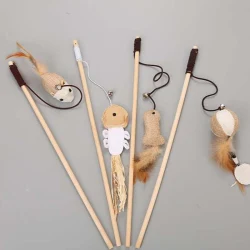Choosing the Perfect Pet Toys: A Guide to Keeping Your Pets Happy and Healthy
2024-08-12
Pets are more than just companions—they are members of the family. Like any family member, they deserve the best care, attention, and, of course, entertainment. Pet toys are essential for keeping your furry friends active, engaged, and mentally stimulated. In this blog post, we’ll explore how to choose the perfect pet toys for your dog, cat, or small animal, ensuring that they stay happy and healthy.
1. The Importance of Pet Toys
Pet toys do more than just entertain—they play a crucial role in your pet’s overall well-being. Here are some key reasons why pet toys are essential:
- Physical Exercise: Toys encourage your pets to move, chase, and play, helping them stay fit and avoid obesity. Regular physical activity is vital for preventing health issues like joint problems and heart disease.
- Mental Stimulation: Engaging toys challenge your pet’s mind, keeping them sharp and reducing boredom. Mental stimulation is especially important for intelligent breeds and can prevent behavioral issues.
- Bonding Time: Playing with your pet strengthens the bond between you and your furry friend. Interactive toys like tug ropes and fetch balls allow you to engage with your pet, fostering a closer relationship.
- Dental Health: Chew toys can help keep your pet’s teeth clean and gums healthy. They provide a safe outlet for natural chewing instincts, which is particularly beneficial for teething puppies.
2. Choosing the Right Toys for Your Dog
When selecting toys for your dog, it’s important to consider their breed, size, age, and play style. Here are some tips to help you choose the right toys:
- Size Matters: Always choose toys that are appropriate for your dog’s size. A toy that is too small can be a choking hazard, while a toy that is too large may be difficult for them to play with.
- Durability: For strong chewers, opt for durable toys made from tough materials like rubber or nylon. Look for toys that are specifically designed to withstand heavy chewing.
- Interactive Toys: Dogs love interactive toys that engage their natural instincts. Toys that dispense treats, squeak, or move on their own are great for keeping your dog entertained and mentally stimulated.
- Soft Toys: For gentler dogs or those who enjoy carrying toys around, soft plush toys can be a great choice. Just be sure to supervise your dog with plush toys, as they may tear them apart and swallow stuffing or squeakers.
- Fetch Toys: If your dog loves to run and chase, fetch toys like balls and frisbees are ideal. These toys encourage physical exercise and are perfect for outdoor play.
3. Selecting Toys for Your Cat
Cats are natural hunters, and their toys should reflect their instinctual behaviors. Here’s how to choose the best toys for your feline friend:
- Chase and Pounce: Cats love to chase moving objects, so toys that mimic the movements of prey, like feather wands and laser pointers, are excellent choices. These toys tap into your cat’s hunting instincts and provide hours of entertainment.
- Interactive Puzzle Toys: Puzzle toys that challenge your cat to figure out how to retrieve a treat or toy can provide mental stimulation. These toys help prevent boredom and keep your cat’s mind sharp.
- Catnip Toys: Many cats are attracted to catnip, a natural herb that induces playful behavior. Catnip-filled toys are a great way to encourage play, but keep in mind that not all cats are affected by catnip.
- Scratching Toys: Scratching is a natural behavior for cats, so providing toys and scratching posts is essential. These toys help keep your cat’s claws healthy and prevent them from scratching furniture.
- Soft Toys: Cats often enjoy batting around small, soft toys like mice or balls. These toys are lightweight and easy for cats to carry and toss around.
4. Toys for Small Animals
Small animals like rabbits, guinea pigs, and hamsters also benefit from toys that encourage natural behaviors and provide mental stimulation:
- Chew Toys: Small animals need to chew to keep their teeth healthy and prevent overgrowth. Safe chew toys made from wood or hay are ideal for rabbits and guinea pigs.
- Tunnels and Hideouts: Small animals love to explore and hide, so providing tunnels, tubes, and hideouts in their enclosure can keep them entertained and active.
- Exercise Wheels: For hamsters and gerbils, exercise wheels are essential. Make sure the wheel is the right size for your pet and has a solid surface to prevent injury.
- Foraging Toys: Toys that encourage foraging, like treat balls or hay-filled toys, can stimulate your small animal’s natural instincts and provide enrichment.
5. Safety Tips for Pet Toys
While pet toys are important for your pet’s well-being, it’s crucial to prioritize safety:
- Regular Inspection: Check your pet’s toys regularly for signs of wear and tear. Discard any toys that are damaged or could pose a choking hazard.
- Supervision: Always supervise your pet with new toys, especially if they are aggressive chewers or if the toy has small parts that could be swallowed.
- Non-Toxic Materials: Choose toys made from non-toxic materials to ensure your pet’s safety. Avoid toys with harmful chemicals or dyes.
Conclusion
Choosing the right pet toys is essential for keeping your pets happy, healthy, and engaged. By selecting toys that suit their size, breed, and play style, you can provide hours of entertainment and strengthen the bond between you and your furry friend. Remember to prioritize safety and regularly inspect your pet’s toys to ensure they remain safe and fun to play with. Whether you have a playful puppy, a curious cat, or a small animal, the right toys can make all the difference in their quality of life.



